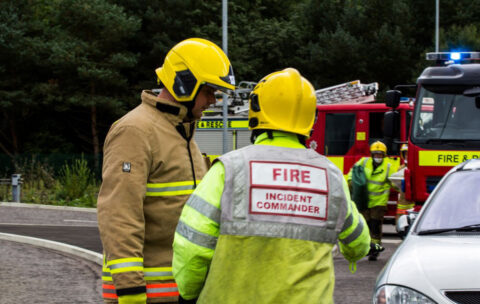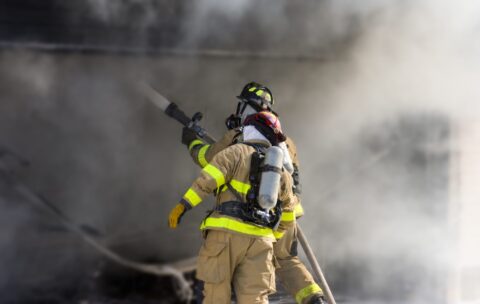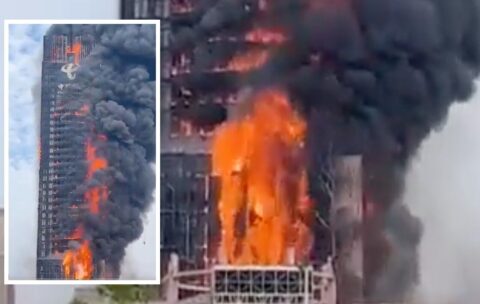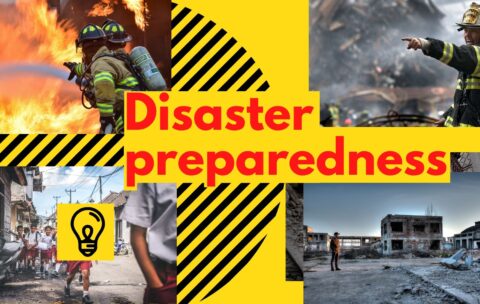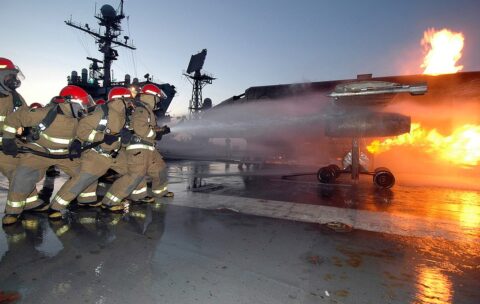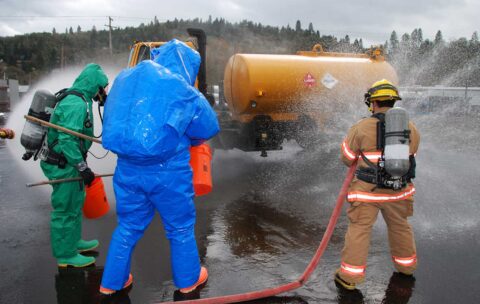ICS 300 – Intermediate Incident Command
Intermediate Incident Command (ICS 300) is a three-day course designed …
What you'll learn
Explain the ways in which the command and management components of NIMS support the management of an extended incident.
Describe the process of incident/event management for supervisors according to the Incident Command System (ICS).
Create Incident Action Plans for simulated incident situations.
Firefighting Strategies & Tactical Considerations
This two-week course is designed to help fire officers improve …
What you'll learn
Acquire the necessary information needed before an emergency to make effective and appropriate tactical responses.
Comprehend the elements of an Incident Action Plan, and the steps involved in decision-making for these plans.
Understand the strategies employed by engine and truck companies in emergency situations.
Recognize the different types of building construction and how they impact firefighting tactics.
Comprehend the responsibilities of a fire officer in identifying and addressing building collapse concerns.
Dealing with High-rise Building Fires
This 3-day course is designed to train fire officers and …
What you'll learn
Identify the construction systems, fire behavior problems, and building systems in high-rise constructions and understand how they impact strategies, tactics, and life safety.
Be familiar with the strategic and tactical operations and the necessary resources for high-rise firefighting operations.
Describe the proper ventilation techniques used in high-rise operations.
Recognize the roles and responsibilities of first-site arrivals and incident commanders, including commands and procedures for high-rise operations.
Disaster Preparedness and Management Course
The 5-day Crises Preparedness and Management Course is designed to …
What you'll learn
Demonstrate an understanding of the Disaster Preparedness & Management System, including planning and response strategies.
Develop an awareness of the preparedness cycle, useful planning tools, and emergency support functions.
Create a personal action plan that promotes a culture of preparedness.
Analyze risks, stakeholder requirements, and emergency planning.
Assess and plan for both known existing hazards and potential future hazards.
Encourage the exchange of ideas through discussion and brainstorming, and build upon those ideas for the next steps.
Industrial Incidents (Incident Command, Response & Management)
A 3-day course is available for fire service management personnel …
What you'll learn
Acquire the essential knowledge, comprehension, and abilities to fulfill the position of an Industrial Incident Commander or contribute effectively as a member of an Industrial Incident Commanding and Response team.
Aircraft’s Fire Fighting Strategies & Tactics
This three-day course is designed to provide comprehensive coverage of …
What you'll learn
Discuss the responsibilities of airport firefighters.
Identify the safety considerations for ARFF (Aircraft Rescue and Firefighting) operations.
Explain the types of extinguishing agents used in ARFF operations.
Evaluate the effectiveness of ARFF operations in mitigating common aircraft emergencies.
Highlight the necessary rescue operations for an aircraft incident.
Demonstrate the use of an airport emergency plan when responding to airport emergencies.
Responding to Hazardous Materials Incidents
Engaging and motivating students are always very challenging task faced …
What you'll learn
Describe the standards, laws, and legislation that apply to the initial response to hazardous materials incidents.
Appreciate the importance of safety during the response to hazardous material incidents.
Identify the class of hazardous materials present at the scene.
Explain the benefits and consequences of basic concepts and procedures used in managing hazardous materials sites and setting up the scene.
Understand the role of first responders in decontamination during hazardous materials incidents.
Be familiar with the challenges and risks associated with the initial response to hazardous materials incidents.
Occupational Safety & Health Program & Practices
This three-day workshop provides the participants with an introduction to …
What you'll learn
Identify the different fields of safety and risk management.
Identify and describe the organization of regulatory agencies that handle issues related to occupational safety and health, environmental health, and risk management.
Define and understand the basic terminology used in the field of occupational safety and health, and use it appropriately.
Describe and demonstrate how to access safety information and resources.
Develop a basic understanding of workers' compensation plans.
Recognize the importance of training and building competencies to reduce accident and incident rates.

